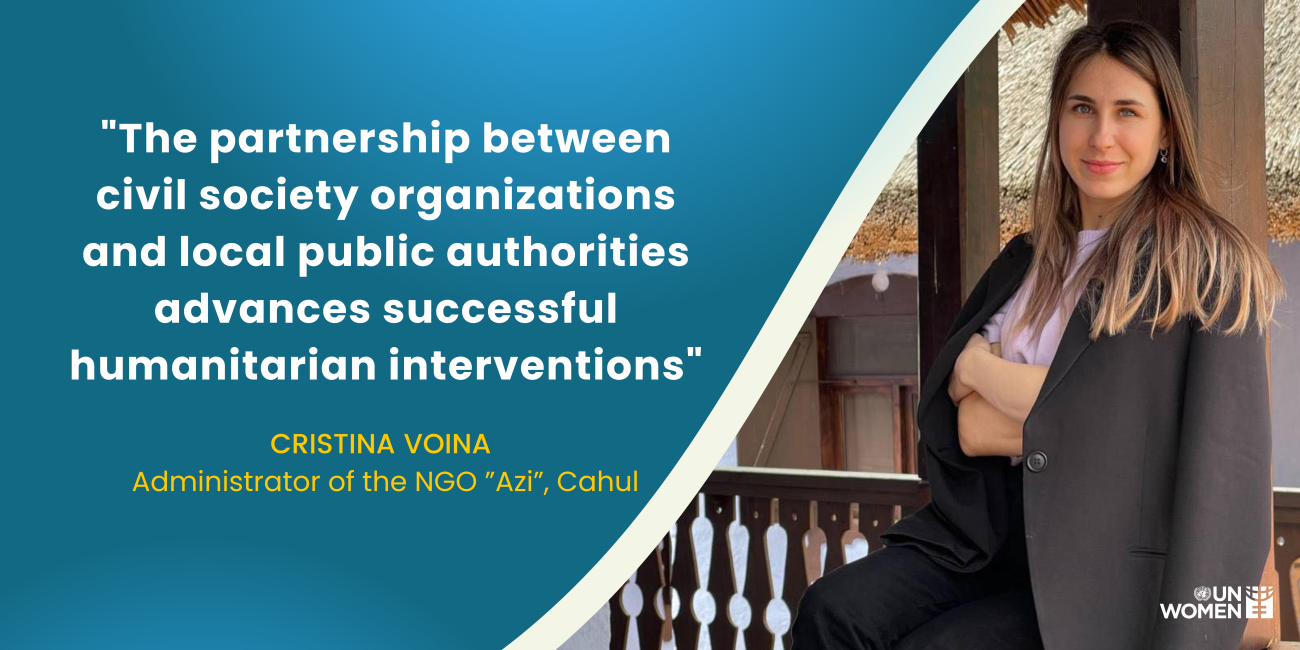In the words of Cristina Voina: "The partnership between civil society organizations and local public authorities advances successful humanitarian interventions"

Cristina Voina, a dedicated and passionate person, is a valuable member of the community in Cahul.
At the age of 28, she dedicates her time and energy to the service of others through her remarkable activity at the NGO ”Azi”. Since 2017, Cristina has chosen to get involved as a volunteer within the NGO, showing a special commitment to the projects and needs of the local community. Through her efforts and active involvement, she managed to gain the appreciation and trust of her colleagues, and in 2019, she was employed as a project assistant. After maternity leave in November 2022, Cristina returned with even more determination and self-confidence. She took over the role of administrator within the NGO, bringing perfect professionalism and breathing new life into operational and administrative management. Today, Cristina delivers her contribution through various projects and initiatives carried out in order to provide support and help to people fleeing the war.
”Since the first days of the war, my colleagues from the association have been involved by offering help to refugees, initially within the "Crisis Cell" at the informational help office - a tea/coffee, a kind word and then through projects implemented. We decided to get involved because we are always open to offering help to people in need, and we cannot stay away when people require our support. I believe that local public authorities (LPAs) are responsible for managing any humanitarian crisis, and by involving them, other institutions and citizens, these crises can be overcome more easily. They provide many benefits in terms of delivering humanitarian assistance, coordinated response efforts and emergency communication. LPAs can help collect data on the impact of humanitarian crises quickly and efficiently. Through them, users can report incidents, provide information about their needs and help monitor the situation in real time.
I can say that the public authorities in our locality were receptive, involved and active. Together, we achieved the expected results easily. We haven't had cases where they didn't want to be involved or approve something that was necessary. Direct support has been provided to refugees by supplying information about help centres, the distribution of food, water and other essential resources. It also facilitated access to healthcare, counselling and psychological support services.
This Action Plan also provides security in terms of material assistance to refugees who are provided with logistics, transport and telecommunications services. Beneficiaries have access to inclusive services, namely: socio-economic, medical, social assistance, education and employment. The Action Plan had and continues to have the role of establishing partnerships with the Local Public Administration of levels one, two and with local NGOs. This contributes to strengthening the capacities of CSOs in the southern region of the country to provide immediate informational and psychosocial support. The document has been created to have long-term effects, and it will ensure resources to manage the refugee crisis by facilitating social and economic integration (taking into account factors such as gender, age, disability and other characteristics).
We really want all the efforts made in this project not to end with its completion but to have continuity. We, as a NGO, as well as LPAs and other actors involved, will do our best to overcome this refugee crisis.
My recommendation to other civil society organizations wishing to establish partnerships with local public authorities would be that after a suitable LPA has been identified and potential partnerships have been discussed, clear agreements should be established, and the terms of the partnerships should be set out early. This may include aspects such as data privacy, technical support and any other necessary conditions. Therefore, the cooperation between civil society organizations and local public authorities propels successful humanitarian interventions. It is important that they look together in the same direction, acting transparently, legally and only in favor of the beneficiaries.”
The NGO "Azi" implements the project "Civil society contributes to the inclusion of girls and women refugees" following the sub-granting provided by NGO "Institutum Virtutis Civilis", a UN Women partner organization, which benefited from financial support from the Women's Peace and Humanitarian Fund, in order to strengthen institutional capacities to provide a prompt and efficient response to the humanitarian crisis.




